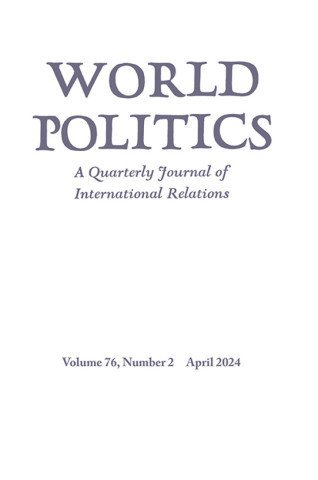透视与安全困境思考:来自中国和美国的实验证据
IF 4.5
1区 社会学
Q1 INTERNATIONAL RELATIONS
引用次数: 0
摘要
摘要:中美关系的核心挑战之一是中美之间出现安全困境的风险,因为双方都出于自认为的防御动机采取行动,却没有意识到对方是如何看待这些行动的。然而,中美两国公众究竟有多容易受到支撑安全困境的心理偏见的影响?这些偏见的有害影响能否得到缓解?作者在中国和美国进行了平行的二元跨国调查实验,探索了安全困境的微观基础。我们发现微观层面的证据与两国公众的安全困境逻辑一致。我们还发现,国际关系(ir)学者们夸大了视角选择的缓和效应,当行为者的身份和目标受到感知到的威胁时,视角选择会适得其反。作者的发现对研究中美关系中的舆论和国际关系中的视角选择具有重要意义。本文章由计算机程序翻译,如有差异,请以英文原文为准。
Perspective-Taking and Security Dilemma Thinking: Experimental Evidence from China and the United States
abstract: One of the central challenges in China-US relations is the risk of a security dilemma between China and the United States, as each side carries out actions for what it perceives to be defensively motivated reasons, failing to realize how they are perceived by the other side. Yet how susceptible to the psychological biases that undergird the security dilemma are the Chinese and American publics? Can these biases' deleterious effects be mitigated? The authors explore the microfoundations of the security dilemma, fielding parallel dyadic cross-national survey experiments in China and the United States. We find microlevel evidence consistent with the logic of the security dilemma in publics in both countries. We also find that international relations (ir) scholars have overstated the palliative effects of perspective-taking, which can backfire in the face of perceived threats to actors' identities and goals. The authors' findings have important implications for the study of public opinion in China-US relations and perspective-taking in ir.
求助全文
通过发布文献求助,成功后即可免费获取论文全文。
去求助
来源期刊

World Politics
Multiple-
CiteScore
8.40
自引率
0.00%
发文量
24
期刊介绍:
World Politics, founded in 1948, is an internationally renowned quarterly journal of political science published in both print and online versions. Open to contributions by scholars, World Politics invites submission of research articles that make theoretical and empirical contributions to the literature, review articles, and research notes bearing on problems in international relations and comparative politics. The journal does not publish articles on current affairs, policy pieces, or narratives of a journalistic nature. Articles submitted for consideration are unsolicited, except for review articles, which are usually commissioned. Published for the Princeton Institute for International and Regional Affairs
 求助内容:
求助内容: 应助结果提醒方式:
应助结果提醒方式:


